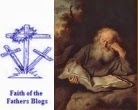Bishop, Early Church Father, And Doctor of the Church
Saint Ambrose of Milan (also known as The Honey Tongued Doctor; Ambrogio) was born around 340 A.D. in Trier, southern Gaul (modern Germany). He is a Latin Father of the Church and a Doctor of the Church. His father was Prefect of Gaul (a region of western Europe that covered roughly what is now France, Belgium, and neighboring parts of Italy, the Netherlands, and Germany). He was the brother of Saint Marcellina and Saint Satyrus. He was educated in the classics, Greek, and philosophy at Rome. He was a poet and noted orator and he was a convert. Ambrose distinguished himself as a lawyer and as consular governor of Liguria and Æmilia, with his residence in Milan.
When the bishop of Milan died, a dispute over his replacement was leading to violence. Saint Ambrose intervened to calm both sides. While he was striving to hold an orderly election of a bishop to that see in 374, he impressed everyone involved so much that while he was still an unbaptized catechuman, he was chosen to fill the see. He resisted, claiming that he was not worthy, and out of his reverence for Baptism, as he was still only preparing for it. To prevent further violence, he assented, was baptized, ordained as a priest, and consecrated bishop on December 7, 374. He immediately gave away his wealth to the Church and the poor both for the good it did, and as an example to his flock.
He studied the Scriptures and the Fathers, and preached every Sunday, frequently on virginity. His popularity enabled him to withstand the fierce Arian heretics and the encroachments of the secular powers on the Church. His influence over the rulers was such that when Emperor Theodosius had caused the massacre of thousands of citizens at Thessalonica, Ambrose insisted on his doing public penance, which the Emperor did. His preaching helped convert Saint Augustine of Hippo, whom Ambrose baptized and brought into the Church. He called and chaired several theological councils during his time as bishop, many devoted to fighting heresy. Saint Ambrose welcomed Saint Ursus and Saint Alban of Mainz when they fled Naxos to escape Arian persecution, and then sent them on to evangelize in Gaul and Germany.
The title "Honey Tongued Doctor," initially bestowed because of his speaking and preaching ability, led to the use of a beehive and bees in his iconography, symbols which also indicate wisdom. This led to his association with bees, beekeepers, chandlers, and wax refiners. Ambrose left many writings on Scripture, priesthood, virginity, and doctrinal subjects, and composed many hymns and is one of the founders of Christian hymnology. Ambrosian Chant, Ambrosian Hymnography, and the Milanese (Ambrosian) Rite are named after him.
Saint Ambrose died of natural causes on Holy Saturday, April 4, 397 at Milan, Italy , and his relics are at the Basilica of Milan.
Below are some quotations from Saint Ambrose of Milan:
No one heals himself by wounding another. -- Saint Ambrose
* * * * * * *
Our own evil inclinations are far more dangerous than any external enemies. -- Saint Ambrose
* * * * * * *
But if these beings angels guard you, they do so because they have been summoned by your prayers. -- Saint Ambrose
* * * * * * *
The Church of the Lord is built upon the rock of the apostles among so many dangers in the world; it therefore remains unmoved. The Church’s foundation is unshakable and firm against assaults of the raging sea. Waves lash at the Church but do not shatter it. Although the elements of this world constantly beat upon the Church with crashing sounds, the Church possesses the safest harbor of salvation for all in distress.
There is a stream which flows down on God’s saints like a torrent. There is also a rushing river giving joy to the heart that is at peace and makes for peace.
He who read much and understands much, receives his fill. He who is full, refreshes others. So Scripture says: “If the clouds are full, they will pour rain upon the earth.”
Therefore, let your words be rivers, clean and limpid, so that you may charm the ears of people. And by the grace of your words win them over to follow your leadership. Solomon says: “The weapons of the understanding are the lips of the wise”; and in another place he says: “Let your lips be bound with wisdom.” That is, let the meaning of your words shine forth, let understanding blaze out. Let no word escape your lips in vain or be uttered without depth of meaning. -- from a letter by Saint Ambrose
* * * * * * *
To avoid dissensions we should be ever on our guard, more especially with those who drive us to argue with them, with those who vex and irritate us, and who say things likely to excite us to anger. When we find ourselves in company with quarrelsome, eccentric individuals, people who openly and unblushingly say the most shocking things, difficult to put up with, we should take refuge in silence, and the wisest plan is not to reply to people whose behavior is so preposterous. Those who insult us and treat us contumeliously are anxious for a spiteful and sarcastic reply: the silence we then affect disheartens them, and they cannot avoid showing their vexation; they do all they can to provoke us and to elicit a reply, but the best way to baffle them is to say nothing, refuse to argue with them, and to leave them to chew the cud of their hasty anger. This method of bringing down their pride disarms them, and shows them plainly that we slight and despise them. -- Saint Ambrose


